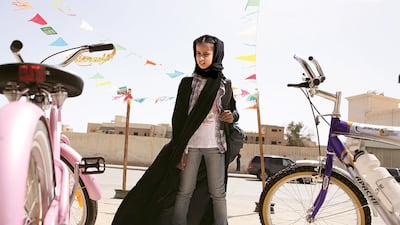The forthcoming Oscars were among the main topics of discussion across the halls of the Madinat Jumeirah during last month’s Dubai International Film Festival. In what felt like a definite first, the Middle East looked like it would have a sizeable presence among the line-up of nominations when the sharp suits and fancy frocks of Hollywood converge on Los Angeles’ Dolby Theatre on March 2. And leading the pack of expectation was the top film from Dubai’s 2012 festival, Wadjda.
Since it debuted in Venice that summer, Haifaa Al Mansour’s quiet family drama charmed almost all who were fortunate enough to see it, winning numerous awards (including the main gong at DIFF, which had supported the film since script stage) and going on general release across much of Europe and the US. Critics offered Wadjda almost universal acclaim, with an average of 8.1 out of 10 on the aggregator website Rotten Tomatoes and a position on several film-of-the-year charts. There was little wonder that it was among the favourites for the Academy Awards’ Best Foreign Language Film competition.
But aside from its compelling plot, following a young girl living on the outskirts of Riyadh who dreams of owning a bicycle, what made Wadjda a truly wonderful entrant was the story behind the film itself.
To begin with, it was the first participant in the Academy Awards from Saudi Arabia, a land famously without any cinemas to its name. It was also the first feature to be entirely shot in the country. Saudi movie fans usually flock to Bahrain or the UAE to get their big-screen kicks, yet here was an offering actually created on their home soil (yet unable to find a theatre there to screen it). The manner of its production was also something to behold, with Al Mansour taking almost five years to find funding and get permissions. Because of the strict nature of Saudi society, Al Mansour couldn’t be seen with her male cast and crew in public, so had to direct several scenes from the back of a van via walkie-talkie. In the face of such obstacles – which would seem utterly preposterous to most filmmakers – many would have given up or at least moved production to a different country.
Al Mansour has become an ambassador for the region, too. In the interviews and discussion she has given since the film first caught the public eye, she has spoken of her desire to open a respectful dialogue with the conservatives in Saudi Arabia to enact gradual change. “I speak their language, like a very local Saudi,” she once told me. “They feel I’m their daughter, I hope.”
Like its scriptwriter and director, the film has been a superb bridge-building tool; opening a window onto a secretive country that few outsiders truly understand. In a time when talk of Saudi’s global influence has become a much-discussed subject, anyone wishing to appreciate life inside the Kingdom would be urged to take their education from Wadjda rather than the news headlines.
Unfortunately, when the Academy announced the list of nine foreign-language films making it through to the next round in the race to the Oscars, Wadjda was the shocking omission from the list. Some other favourites failed to make it through, too, but none, arguably, as appreciated or noteworthy. While no reason was given, a great opportunity to shine a light on a country that has so far remained under the shadows has been missed.
The region still has high hopes for Hany Abu-Assad’s Omar, which was hugely popular at last month’s DIFF. But if you’d asked anyone there which film their money would have been on, it’s likely to have been the superb Saudi drama from the year before.

